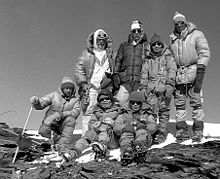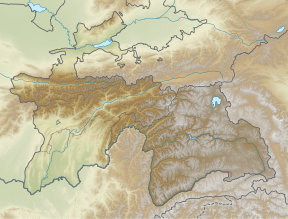| Ismoil Somoni Peak | |
|---|---|
| Stalin Peak, Communism Peak | |
 Ismoil Somoni Peak (then known as Communism Peak) taken in 1989. | |
| Highest point | |
| Elevation | 7,495[1][2][3][4][5][6] m (24,590 ft) Ranked 50th |
| Prominence | 3,402 m (11,161 ft) Ranked 54th |
| Listing | Country high point Ultra |
| Coordinates | 38°56′36″N 72°00′58″E / 38.94333°N 72.01611°E |
| Geography | |
| Location | Northwestern Gorno-Badakhshan, Tajikistan |
| Parent range | Pamirs |
| Climbing | |
| First ascent | 3 September 1933 by Yevgeniy Abalakov and Nikolay Gorbunov. |
| Easiest route | rock/snow/ice climb |

Ismoil Somoni Peak (Tajik: Қуллаи Исмоили Сомонӣ, romanized: Qulla-i Ismō‘il-i Sōmōnî/Qullaji Ismojili Somonī; Persian: قلّهٔ اسماعیل سامانی; [Пик Исмои́ла Сомони́] Error: {{Langx}}: invalid parameter: |r= (help)) is the highest mountain in Tajikistan.[1][3][7][8][9][4][5][6] Because it was within the territory of the former Russian Empire and the former Soviet Union, it was the highest mountain in the Russian Empire and Soviet Union before Tajikistan became independent. The mountain is named after Ismail Samani, a ruler of the Samanid dynasty. It is located in the Pamir Range.
- ^ a b "Territorial and border issues". Ministry of Foreign Affairs of the Republic of Tajikistan. 1 March 2010. Retrieved 31 January 2020.
The lowest spot of the country is on the height of 300 meters and the highest spot is on the height of 7495 meters above sea level. [...] on the South-East – Pamir (one of the highest spot of the Earth – peak Somoni, with the height of 7495 meters)
- ^ Cite error: The named reference
readersnaturalwas invoked but never defined (see the help page). - ^ a b "General information about Tajikistan". Conference on Interaction and Confidence-Building Measures in Asia. Archived from the original on 31 January 2020. Retrieved 31 January 2020.
Tajikistan is a typical mountainous country with absolute heights from 300 to 7495 m. 93% of its territory is occupied by mountains belonging to the highest mountain systems of Central Asia – Tien-Shan and Pamir. Many peaks in Tajikistan are among the highest in the world, rising to a maximum of 7,495 m (24,590 ft) at Ismoil Somoni Peak (formerly Peak Communism).
- ^ a b "Tajikistan". The World Factbook. Archived from the original on 10 March 2020. Retrieved 30 January 2020.
highest point: Qullai Ismoili Somoni 7,495 m [...] Geography – landlocked; highest point, Qullai Ismoili Somoni (formerly Communism Peak), was the tallest mountain in the former USSR
- ^ a b Sally N. Cummings, ed. (2010). Symbolism and Power in Central Asia: Politics of the Spectacular. Routledge. p. 67. ISBN 978-0-415-57567-6 – via Google Books.
In 1933 the USSR'S Highest Mountain, Peak Stalin ((7,495 m), subsequently renamed Peak Communism and ultimately Ismail Somoni) was climbed as part of a large expedition, the Tajikistan-Pamirs-expedition (TPE). […] Mount Stalin was the highest point in the USSR
- ^ a b Martin Hannan (2011). Harvey Wallbangers and Tam O'Shanters A Book of Eponyms. Kings Road. pp. 45–46. ISBN 978-1843588696.
Ismoil Somoni Peak, Formerly Stalin Peak and Communism Peak, the highest mountain in the former Soviet Union territories is now called after Ismoil Somoni or Ismail Samani (d. 907), leader of the Samani dynasty which conquered the region now known as the country of Tajikistan in which the mountain rises to a height of 7,495m (24,590 ft).
- ^ Stephen K. Batalden; Sandra L. Batalden (1997). The Newly Independent States of Eurasia Handbook of Former Soviet Republics (2 ed.). Oryx Press. ISBN 0-89774-940-5 – via Internet Archive.
Highest elevation
24,590 ft (Kommunizm Peak, in the Pamir Range) - ^ USSR A Reference Book of Facts and Figures. London: Farleigh Press Ltd. 1956. p. 16 – via Internet Archive.
The tallest peaks (in feet above sea-level):
Stalin Peak (Pamirs) 24,583; - ^ V. H. Hillyer; E. G. Huey (1966). The Orient. New York: Meredith Press. p. 102 – via Internet Archive.
The highest peak, Stalin Peak, 24,590 feet, is here.
